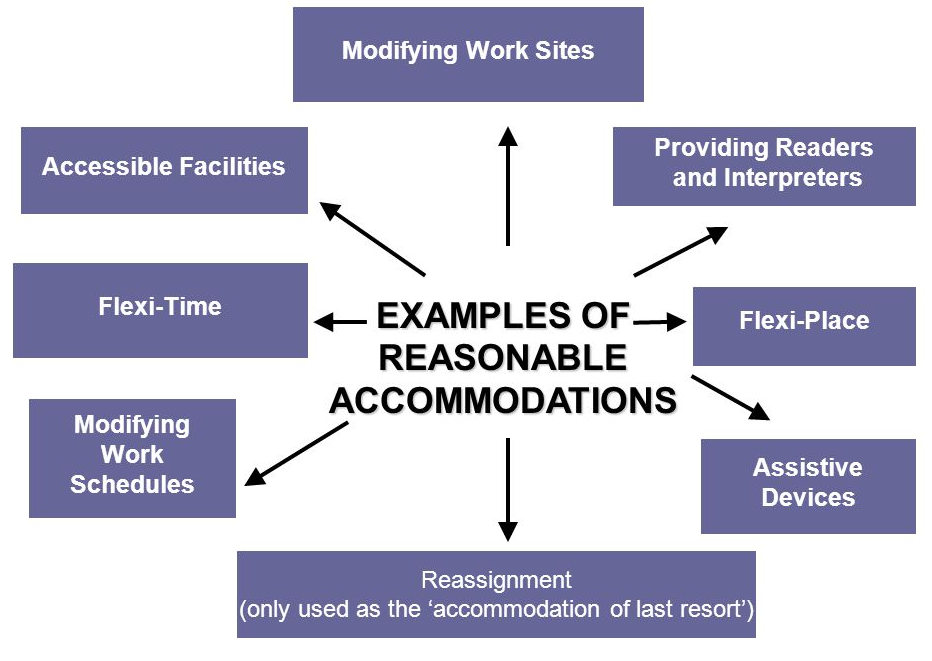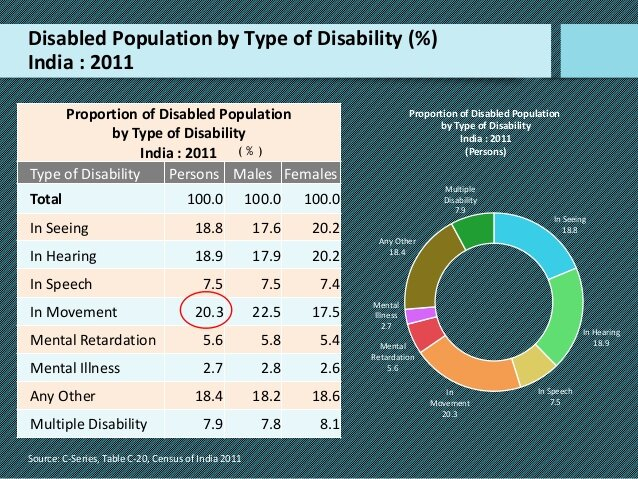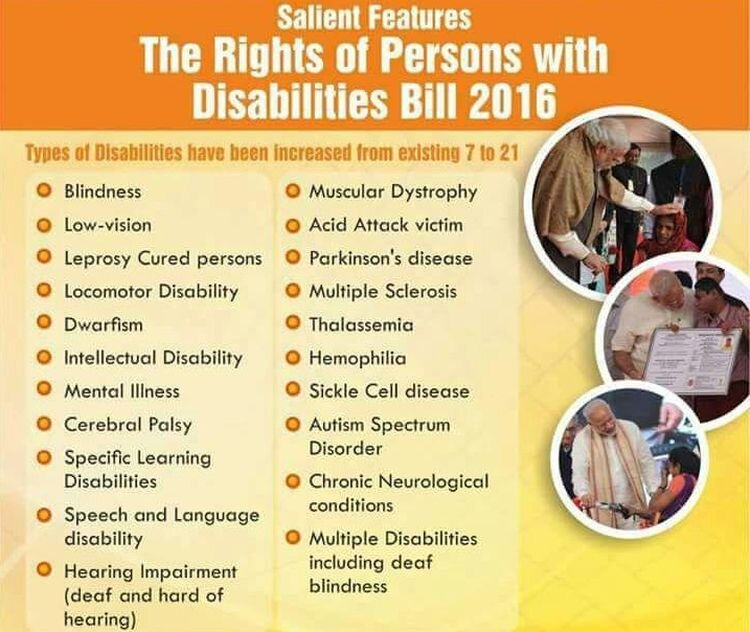Social Justice
Reasonable Accommodations: A Welfare-Based Approach
- 27 Jul 2024
- 12 min read
This editorial is based on “Reasonable accommodations and disability rights ” which was published in The Hindu on 22/07/2024. The article talks about the Legal Framework for Reasonable Accommodations (RAs) and the State’s Role in the implementation of the legal framework for persons with disability.
For Prelims: Reasonable Accommodations (RAs), Rights of Persons with Disabilities Rules, 2017, RPwD Act, 2016, Rehabilitation Council of India Act, 1992, Mental Health Care Act, 2017, Accessible India Campaign, DeenDayal Disabled Rehabilitation Scheme, National Fellowship for Students with Disabilities
For Mains: Significance of Reasonable Accommodations, Model to Empower Persons with Disabilities in India.
The principle of reasonable accommodations (RAs) represents a pivotal shift towards inclusivity and equality. It underscores the commitment to integrate Persons with Disabilities (PwDs) fully into the social, economic, and cultural fabric of the nation.
The principle of RAs under the Rights of Persons with Disabilities (RPwD) Act, 2016, aims to ensure that Persons with Disabilities (PwDs) can exercise their rights on an equal footing with others.
The Convention on the Rights of Persons with Disabilities (CRPD) provides guidelines for determining undue burden. Despite this, many Indian institutions are hesitant to cover the costs of RAs due to financial concerns. Moreover, they often use a cost-benefit approach, focusing on efficiency rather than considering the welfare of Persons with Disabilities (PwDs).
So, to embrace a welfare-based approach and to address issues concerning reasonable accommodations, the state must establish clear guidelines for legal and reasonable accommodations.
What is the Principle of Reasonable Accommodation?
- About:
- Reasonable accommodation is a principle designed to promote equality and safeguard the rights of individuals. These accommodations may include physical adjustments like ramps or technological aids and modifications to job requirements or policies. This principle is chiefly applied in the disability rights sector.
- Obligations on State:
- It embodies the obligation of both the State and private entities to provide necessary support to individuals with disabilities, ensuring their full and effective participation in society.
- Without such accommodations, constitutional guarantees of equality (Article 14), freedom (Article 19), and the right to life (Article 21) become ineffective for persons with disabilities.
- It embodies the obligation of both the State and private entities to provide necessary support to individuals with disabilities, ensuring their full and effective participation in society.
- Global Standards:
- According to Article 2 of the UN Convention on the Rights of Persons with Disabilities(UNCRPD), RAs include necessary and appropriate modifications or adjustments that do not impose an undue or disproportionate burden.
What is the Significance of Reasonable Accommodation?
- Enabling Equal Participation:
- It is essential for bridging the gap between PwDs and their non-disabled peers. They help ensure that disability does not hinder one's access to education, employment, or public services.
- Example: Providing ramps and elevators in public buildings ensures that individuals with mobility impairments can access essential services and facilities on par with others.
- It is essential for bridging the gap between PwDs and their non-disabled peers. They help ensure that disability does not hinder one's access to education, employment, or public services.
- Promoting Inclusion:
- RAs foster a culture of inclusion and acceptance. It challenges discriminatory attitudes and stereotypes by demonstrating a commitment to creating an environment where everyone feels valued and respected.
- Example: Offering sign language interpreters in educational institutions enables deaf students to participate actively in classroom discussions and learning.
- RAs foster a culture of inclusion and acceptance. It challenges discriminatory attitudes and stereotypes by demonstrating a commitment to creating an environment where everyone feels valued and respected.
- Upholds Human Rights:
- It is a fundamental aspect of human rights, as enshrined in international treaties like the UN Convention on the Rights of Persons with Disabilities (UNCRPD).
- Example: Providing assistive technology to visually impaired individuals allows them to access information and communicate effectively, exercising their right to freedom of expression.
- It is a fundamental aspect of human rights, as enshrined in international treaties like the UN Convention on the Rights of Persons with Disabilities (UNCRPD).
- Economic Empowerment:
- RAs in the workplace is crucial for empowering persons with disabilities economically.
- Example: Adapting job roles or providing flexible work arrangements for employees with disabilities can help them maintain employment and achieve career progression.
- RAs in the workplace is crucial for empowering persons with disabilities economically.
What are the Major Concepts of Disability In India?
- About:
- According to Census 2011, there are 2.68 crore persons with disabilities in India, constituting 2.21% of the total population.
- Types of Disabilities Under PwD Act, 2016:
- The Rights of Persons with Disabilities (RPwD) Act, 2016, recognizes 21 types of disabilities, including Locomotor Disability, Visual Impairment, Hearing Impairment, Speech and Language Disability, Intellectual Disability, Multiple Disabilities, Cerebral Palsy, and Dwarfism.
- Disability Rights Models:
- Medical Model: Focuses on the individual's impairment and its treatment.
- Social Model: Views disabilities as a societal issue, advocating for equal rights and integration into society.
- Human Rights Model: Builds on the social model, emphasizing that individuals with disabilities should have equal enjoyment of all human rights. This model underpins the Supreme Court's mandate for both government and private sectors to ensure full participation of PwDs.
- Key Legislation
- RPwD Act, 2016: Replaces the 1995 Act, aiming to ensure equal opportunities, rights protection, and full participation for PwDs.
- National Trust Act, 1999: National Trust Act, establishes a body for the welfare of individuals with Autism, Cerebral Palsy, Mental Retardation, and Multiple Disabilities.
- Rehabilitation Council of India Act, 1992: The Rehabilitation Council of India Act regulates the training and registration of professionals in disability rehabilitation.
- Mental Health Care Act, 2017: The Mental Health Care Act safeguards the rights and dignity of persons with mental illness.
What are the Challenges for Institutions in Implementing Reasonable Accommodations?
- Financial Constraints:
- Indian institutions often cite financial constraints as a primary reason for their reluctance to implement RAs for persons with disabilities (PwDs).
- The burden of compliance with anti-discrimination legislation, such as the Rights of Persons with Disabilities (RPwD) Act, 2016, is perceived as a significant financial challenge.
- Utilitarian vs. Welfare-Based Approaches:
- When institutions are solely responsible for the costs of RAs, they tend to adopt a utilitarian approach focused on cost efficiency rather than a welfare-based perspective.
- This approach prioritizes financial considerations over the needs and rights of PwDs, often leading to inadequate or insufficient accommodations.
- Prejudices and Misconceptions:
- Institutions may be influenced by prejudices and misconceptions that PwDs are less productive or that accommodating them is prohibitively expensive.
- Undue Burden Defense:
- The reliance on the undue burden defence by institutions often reflects a misuse of the legal provisions.
- Instead of genuinely assessing the difficulty of implementing RAs, institutions may use this defence to avoid the costs, thereby compromising the rights of PwDs.
- Lack of Awareness and Sensitization: Many institutions and employers are not fully aware of the requirements or benefits of providing reasonable accommodations. This lack of awareness often leads to non-compliance or minimal efforts to make necessary adjustments.
What are the Initiatives Related to the Empowerment of the Disabled?
How can Reasonable Accommodations Be Effectively Implemented?
- Incentivizing and Sharing Costs:
- To incentivise institutions for RAs, a cost-sharing program could subsidize expenses for reasonable accommodations.
- For instance, the government might cover a significant portion of the costs for structural modifications needed to accommodate wheelchair users, helping institutions meet accessibility standards.
- Offering tax benefits, subsidies, or deductions can motivate institutions to proactively provide RAs.
- To incentivise institutions for RAs, a cost-sharing program could subsidize expenses for reasonable accommodations.
- Leveraging the National Fund for PwDs:
- The National Fund for PwDs, established under the Rights of Persons with Disabilities (RPwD) Act, 2016, has substantial but underutilized resources, and utilizing those resources can promote RAs.
- The fund's corpus should be disbursed judiciously based on well-defined criteria, prioritizing high-impact projects and institutions demonstrating commitment to inclusion.
- The National Fund for PwDs, established under the Rights of Persons with Disabilities (RPwD) Act, 2016, has substantial but underutilized resources, and utilizing those resources can promote RAs.
- Attitudinal and Behavioral Changes:
- Integrate disability studies and awareness into school curricula, and conduct comprehensive training programs for employers, employees, and the general public to challenge stereotypes and misconceptions about PwDs.
- Showcasing successful examples of institutions that have implemented RAs and the positive impact it has had.
- Integrate disability studies and awareness into school curricula, and conduct comprehensive training programs for employers, employees, and the general public to challenge stereotypes and misconceptions about PwDs.
- Legal and Policy Framework:
- Impose stricter penalties for non-compliance with disability laws. Provide clear guidelines for determining undue burden to prevent its misuse.
- Establish an independent body to monitor compliance with disability laws and provide technical assistance to institutions.
- Impose stricter penalties for non-compliance with disability laws. Provide clear guidelines for determining undue burden to prevent its misuse.
|
Drishti Mains Question: Q. Discuss the concept of reasonable accommodation and its significance in the context of rights for persons with disabilities. Analyze the key challenges faced in implementing reasonable accommodations in India and policy measures that can be taken to address these challenges. |
UPSC Civil Services Examination, Previous Year Question (PYQ)
Prelims
Q. India is home to lakhs of persons with disabilities. What are the benefits available to them under the law? (2011)
- Free schooling till the age of 18 years in government-run schools.
- Preferential allotment of land for setting up business.
- Ramps in public buildings.
Which of the statements given above is/are correct?
(a) 1 only
(b) 2 and 3 only
(c) 1 and 3 only
(d) 1, 2 and 3
Ans: (d)
Mains
Q. Does the Rights of Persons with Disabilities Act, 2016 ensure effective mechanism for empowerment and inclusion of the intended beneficiaries in the society? Discuss. (2017)









